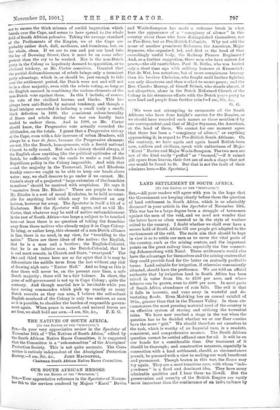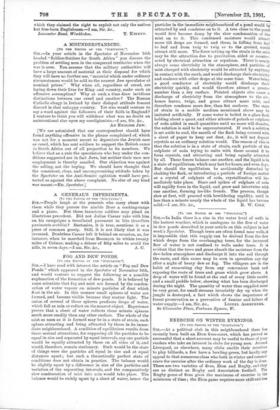LAND SETTLEMENT IN SOUTH AFRICA. (To TIIE EDITOR OF TUB
"SPECTATOR.") your readers will agree with you in the • hope that the Government are keeping clearly before them the question of land settlement in South Africa, which is so admirably discussed in your article in the Spectator of November 16th. This war has to a large degree been a struggle of townsmen against the men of the veld, and we need not wonder that the latter have so often worsted us in the style of warfare suited to the country. I doubt whether we shall ever have a secure hold of South Africa till our people get adapted to the environment of the veld. The main aim that should be kept in view is so to settle our men as to cover the vital parts of the country,- such as the mining centres, and the important points on the great railway lines, especially the line connect- ing Johannesburg with Natal. These settlements would also have the advantage for themselves and the mining centres that they could provide food for the latter on mutually profitable terms. Land suitable for irrigation, if otherwise conveniently situated, should have the preference. We are told on official authority that by irrigation land in South Africa has been raised in value from 10s. to 2150 per acre, and where tobacco can be grown, even to £680 per acre. In most parts of South Africa abundance of rain falls. The evil is that it falls in torrents, and runs away in wasteful and de- vastating floods. Even Mafeking has an annual rainfall of 30 in., greater than that in the Thames Valley. In these cir- cumstances the most pressing material need of the country is an effective system of storing and utilising the torrential rains. We have now reached a stage in the war when the question has to be decided whether we or our Boer cousins have the more " grit." We should therefore set ourselves to the task, which is worthy of an Imperial race, in a resolute, consistent, and comprehensive manner. The South African question cannot be settled offhand once for all. It will be on our hands for a considerable time. Our treatment of it should be thorough; and constructive measures, especially in connection with a land settlement, should, as circumstances permit, be pursued with a view to making our work beneficent and permanent. Though beaten in this war, the Boers may try again. They are a most tenacious race, with whom " inde- pendence " is a fixed and dominant idea. They have many admirable qualities and I bear them • no But the preservation and security of. the British Empire are vastly more important than the continuance of an independence by
which they claimed the right to exploit not only the natives but free-born Englishmen.—I am, Sir, &c.,











































 Previous page
Previous page